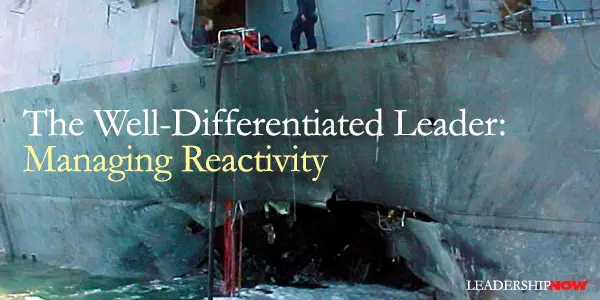 |
 |
03.23.07

The Well-Differentiated Leader: Managing Reactivity
R ECENTLY U.S. Navy Cdr. Kirk S. Lippold spoke about leadership at Highland School in Virginia. You may remember that he was the commander of the USS Cole when it was attacked in Yemen in October of 2000. Lippold said, "When you talk about leadership, for a lot of people, it boils down to one word, and that is integrity. If you have the integrity to do what's right regardless of the circumstances and the situation, you are a leader in your own right, because so many people today fail or waiver on that one key trait. "As commander, you provide the crew with the command philosophy, then you give them goals and guidelines to get there. By that philosophy, you start with the foundation of integrity, but it is also good work ethic, taking care of your fellow sailors, making sure that you look out for each other, not just for the time you are there on the ship, but when you are on liberty.” What he is referring to is similar to an idea Edwin Friedman presents in A Failure of Nerve. It’s what Friedman has termed the well-differentiated leader. It is similar to what is most commonly termed authentic leadership, but I like the way it is articulated here. The well-differentiated leader is not “an autocrat who tells others what to do or orders them around, although any leader who defines himself or herself clearly may be perceived that way by those who are not taking responsibility for their own emotional being and destiny.” By the well-differentiated leader “I mean someone who has clarity about his or her own life goals, and, therefore, someone who is less likely to become lost in the anxious emotional processes swirling about. I mean someone who can separate while still remaining connected, and therefore can maintain a modifying, non-anxious, and sometimes challenging presence. I mean someone who can manage his or her own reactivity to the automatic reactivity of others, and therefore be able to take stands at the risk of displeasing. It is not as though some leaders can do this and some cannot. No one does this easily, and most leaders, I have learned, can improve their capacity.”Two key concepts here are self-knowledge and self-control. What Friedman spurns is a highly anxious risk-avoided, someone who is more concerned with good feelings than with progress, someone whose life revolves around the axis of consensus. He calls this a failure of nerve. Friedman writes, “It is the integrity of the leader that promotes the integrity or prevents the dis-integr-ation of the system he or she is leading.” It was Lippold’s understanding that “you have the integrity to do what's right regardless of the circumstances and the situation” that enabled he and his men to get through the attack. It points again to the fact that leadership is really a character process and not an intellectual one. 
Posted by Michael McKinney at 10:02 AM
|
BUILD YOUR KNOWLEDGE
 

How to Do Your Start-Up Right STRAIGHT TALK FOR START-UPS 
Grow Your Leadership Skills NEW AND UPCOMING LEADERSHIP BOOKS 
Leadership Minute BITE-SIZE CONCEPTS YOU CAN CHEW ON 
Classic Leadership Books BOOKS TO READ BEFORE YOU LEAD |